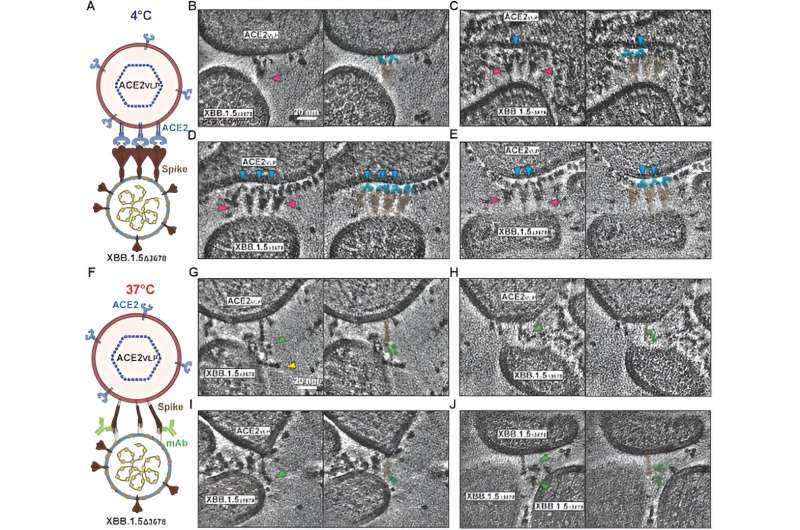This article has been reviewed according to Science X's editorial process and policies. Editors have highlighted the following attributes while ensuring the content's credibility:
fact-checked
peer-reviewed publication
trusted source
proofread
Antibody could offer sweeping protection against evolving SARS-CoV-2 virus

Researchers at Northeastern say they've discovered how an antibody could provide broad protection against severe acute respiratory syndrome coronavirus-2 (SARS-CoV-2), the virus responsible for COVID-19—even as it evolves to outwit other of the body's chemical defenses.
Researchers studied the structure of the spike protein of SARS-CoV-2—the outer projections of the virus' membrane that is responsible for viral entry into a human cell. Following the outbreak of the COVID-19 pandemic, scientists were quick to identify how the spike protein helps hook the virus on to a cell, binding to an enzyme called the ACE-2 receptor.
But it wasn't until researchers began studying the structure of the spike protein that they began to learn more about its somewhat limb-like design—that these protruding strands undergo a rearrangement as they "pull" a cell toward it and initiate fusion.
"For an infection to occur, the spike protein must jump out and grab a human cell," says Paul Whitford, an associate professor of physics at Northeastern, who co-led the theoretical aspects of the study, published in Science.
What the researchers showed was that a specific antibody—known as CV3-25—disrupts the cell infection process by targeting a particular site on the spike protein that is largely conserved across the different viral strains, according to the study.
The receptor binding domain, the critical portion of the spike protein that lets the virus "bind" and ultimately enter the cell, typically changes as the virus evolves, Whitford says. The region that often remains the same is vulnerable to CV3-25.
Think of it as like the virus' Achilles heel.
The results suggest that the broadly neutralizing antibody could hold the key to manufacturing a vaccine that protects against a rapidly evolving virus.
"This is a naturally occurring antibody that was found in specimens taken from people," Whitford says.
The computational work was a joint effort undertaken by the Center for Theoretical Biological Physics at Northeastern and Rice University, a National Science Foundation Physics Frontiers Center. The multi-university team also partnered with a group of researchers at Yale University as part of the overall study.
Whitford's background is in using theoretical models to study "large molecular assemblies"—chemical structures that include viruses and their surface structures. In the vast world of the infinitely small, Whitford has focused primarily on studying the workings of the ribosome, a biomolecular machine responsible for producing the proteins that make up living organisms.
Earlier this month, U.S. health officials said that COVID-19 is no longer a pandemic, but is now "endemic." That means the virus is likely to stick around, only now it's well-managed. But Whitford says more contagious and potentially deadly strains of the virus may still emerge.
"It is still a very significant problem, but one that can now be managed against the backdrop of many public health threats and not as sort of a singular pandemic threat," Aron Hall, deputy director for science at the Centers for Disease Control and Prevention's coronavirus and other respiratory viruses division, said recently, according to NPR. "And so how we approach COVID-19 is very similar to how we approach other endemic diseases."
The findings are significant because scientists have yet to produce a vaccine that protects against all current and future variants of the virus, Whitford says.
"Currently, we're keeping the virus at bay, but it keeps mutating," Whitford says.
Whitford says the antibody could be "the next big target" for the design of new vaccines.
"It opens up a new vaccine strategy," he says. "While current vaccines try to block the arms, our results show how you can tie the legs instead, which gives us a new weapon for combating this ever-changing virus."
More information: Michael W. Grunst et al, Structure and inhibition of SARS-CoV-2 spike refolding in membranes, Science (2024). DOI: 10.1126/science.adn5658
This story is republished courtesy of Northeastern Global News news.northeastern.edu.

















